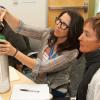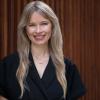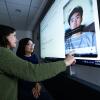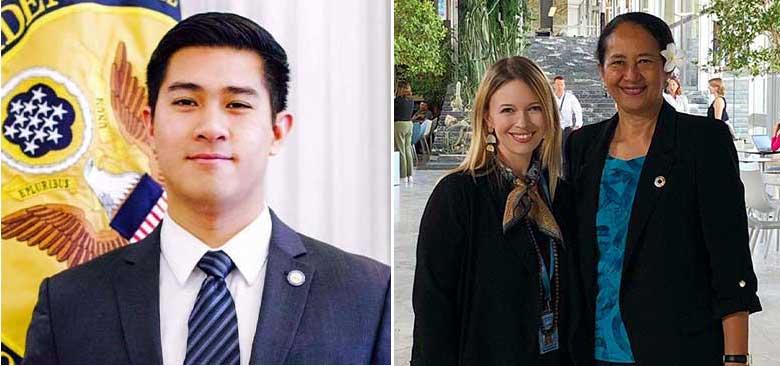
UCSF nursing alumni Chamroeunpaul Chhean (left) and Ashley Moore (with Elizabeth Iro, right, chief nursing officer at the World Health Organization), are leveraging the knowledge and skills they acquired in the School's health policy specialty to make…
Preparing Future Nurse Leaders to Boldly Advocate for Health Policy
When crafting health care policies that affect patients, a nurse’s perspective — their intimate knowledge of patients, ability to identify solutions in a dynamic environment, and understanding of the health care system — is crucial to developing reforms that ensure quality care.
Despite these advantages — and that nurses comprise the largest segment of the health care workforce — nurses are often excluded from health policy development.
The UCSF School of Nursing, through its Master of Science and PhD programs, is equipping future nurse leaders with the knowledge and skills to advocate for meaningful change in health policy.
“We want nurses to have a seat at the table,” said professor Susan Chapman. “We have fewer members in legislative offices and other policymaking groups. We’re underrepresented. We need  Susan Chapman to be heard.”
Susan Chapman to be heard.”
A Leader in Health Policy Education
The School of Nursing has been a leader in health policy education for decades and remains one of three U.S. nursing schools to offer a health policy specialty in their master’s program, according to registerednursing.org.
The School’s health policy curriculum combines didactic and experiential learning led by faculty members Chapman, Ulrike Muench, the health policy specialty coordinator, and Stella Bialous, whose research and expertise in health policy have been sought by health care and government agencies across the globe.
Chapman instructs students on how to translate their research to specific audiences, write policy briefs and impact policymakers through testimony. Muench teaches students how to use data in policy development and evaluate policy effectiveness. Bialous introduces students to health policy theories and examines how policies are constructed. Along with courses examining social determinants of health, health care economics and data analytics, students develop expertise in the key elements of health policy, develop a strong voice to advocate for change, and present data to policy makers and stakeholders to bolster policy solutions.
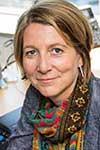 Ulrike Muench Data analytics, a new class introduced to the curriculum this past year, prepares students to use data in the policy process.
Ulrike Muench Data analytics, a new class introduced to the curriculum this past year, prepares students to use data in the policy process.
“Large amounts of health care and population level data are now available everywhere,” Muench said. “Data science is a powerful way to inform evidence-based policy choices, as well as improve health care delivery.”
Courses in the health policy curriculum are open to all master’s and PhD students.
“Nurses should know what to say when that voice is given to them,” Bialous said. “What nurses offer is enhanced by their experiences with patients, their families and the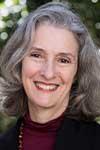 Stella Bialous communities they care for — and that’s important. But there is a whole component of health policy as a discipline that, when added to personal caregiver experience, makes that voice a little louder.”
Stella Bialous communities they care for — and that’s important. But there is a whole component of health policy as a discipline that, when added to personal caregiver experience, makes that voice a little louder.”
Leveraging their expertise and voice to advocate for change was a core message in Congresswoman Lauren Underwood’s keynote speech to the School’s graduating class at Virtual Commencement on June 11. Underwood, a registered nurse whose passion for health policy was stoked in school and who is the youngest Black woman to serve in the U.S. House of Representatives, is working on legislation to improve maternal health.
“What I want graduates to recognize today is it’s in your power to correct the inequities of our health system,” Underwood told the Class of 2021. “Your leadership is key to improving the health of your community. Ability to lead is not tied to age or time spent in the profession. It’s about aggressively applying your expertise, speaking honestly and boldly advocating for the health of your community.”
Combining Classroom Learning With Hands-On Experience
In addition to classroom experiences, students attend health policy seminars and work alongside faculty members on research projects.
Students are required to complete a summer residency at major health care or policy organizations. These can range from regional and state institutions, such as the San Francisco Department of Public Health and Kaiser Permanente, to national or international agencies such as the U.S. Centers for Disease Control and Prevention and the World Health Organization.
Ashley Moore (MS ’20) spent her summer residency in 2019 working at the World Health Organization where she contributed to the State of the World’s Nursing Report — 2020, a report that represents the collaboration of more than 170 countries and outlines policy recommendations for the global nursing workforce. Moore collected data and conducted research supporting the report’s conclusion that a considerable investment in the global nursing workforce is essential to delivering quality, equitable care for all.
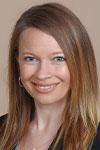 Ashley Moore “The opportunity to collaborate with other nurses, physicians and scientists on a first report of its kind enhanced my world view,” Moore said. “That experience confirmed for me that I want to play a role in health policy.”
Ashley Moore “The opportunity to collaborate with other nurses, physicians and scientists on a first report of its kind enhanced my world view,” Moore said. “That experience confirmed for me that I want to play a role in health policy.”
For Moore, an RN at the Adult Cancer Clinic at UCSF’s Helen Diller Family Comprehensive Cancer Center, studying health policy exposed her to the transformative impact nurses can have on policy development.
“I was limited in my understanding of the potential the nursing voice could have,” she said. “I’ve learned a nurse’s involvement in policy goes far beyond bedside care. Nurses have important roles to play in communities as well as sharing their voice at the state and federal level.”
For students who entered the School’s Master of Science program with health policy experience under their belts, the curriculum allowed them to further enhance their skills.
Chamroeunpaul Chhean (MS ’19) enrolled at UCSF after he served as an agency liaison in the Office of Presidential Correspondence during the Obama Administration, helping coordinate all 50 federal agencies. Later, he worked with the U.S. Senate’s Health, Education, Labor and Pensions Committee, handling responses to the Zika virus outbreak and issues involving mental health and drug abuse.
Even with his experience working at the nation’s capital, Chhean found he was able to build his expertise and gain additional skills at UCSF.
“They teach you to look at problems in different ways,” said Chhean, who also served on the UC Office of the President's Planning and Budget Committee during his time at UCSF. “Not everyone shares the same values so it’s all about how you frame things. And you learn to be resilient. You never know how Chamroeunpal Chhean long your work is going to last.”
Chamroeunpal Chhean long your work is going to last.”
Recently, Chhean applied these skills to lobbying for state bills on expanding scope of practice for nurse practitioners and health insurance coverage for undocumented individuals.
While he currently holds an administrative role at UCSF’s Helen Diller Family Comprehensive Cancer Center, he plans to return to policy work in Sacramento or Washington D.C., leveraging his experience at the School of Nursing.
“I’ve done a lot of education in my life and I’ve never worked with faculty so adept at what they do: crafting policy papers at the highest levels of critical scrutiny,” Chhean said. “I’ll always be grateful to them for their support.”

